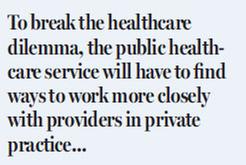HK's public healthcare system still among the best

The mass media have blown up the latest flu outbreak into a medical crisis that is stretching the limits of the public medical system. There have been daily reports of long waits of up to 10 hours on some days for treatment at public clinics and overcrowded hospital wards.
Such reports have reignited the heated debate on medical reform. Much of the blame for the perceived shortcomings of the public health system is focused on the shortage of medical staff, including front-line doctors and nurses. In that case, the solution should be simple and straightforward, so think the politicians and some government officials.
It has been suggested that all it would need to right the system was to spend more money and hire more people. Not enough doctors? No problem. Lower the qualification threshold to bring in doctors from outside of Hong Kong, especially the Chinese mainland. The salaries at public hospitals should be enough to attract many prospective applicants.

When everybody thinks he has the answer, nobody is willing to listen to what the medical community is saying although the message it is trying to get through is loud and clear: The problem is not about money and therefore cannot be solved by simply throwing cash at it.
Medical professionals have always insisted that qualified doctors trained at Hong Kong's two university medical schools are not in short supply. Listen to Professor Joseph Sung Jao-yiu, vice-chancellor of the Chinese University of Hong Kong.
In a talk show at the government television station, Sung said the crux of the issue is that more and more young doctors are turned off by the lack of self-satisfaction in working at public hospitals. Many of them have chosen to further their studies abroad or go into private practice, not necessarily for the promise of higher income but rather for a keener sense of accomplishment.
Medical schools are known to prepare students to face long hours of work under high pressure in their houseman years in public hospitals. But in Hong Kong, challenges facing young doctors at public hospitals are compounded by increasing mistrust of patients and their families, perpetuated by social activists and the gullible press.
As a highly acclaimed medical doctor himself, Sung told the host that everyone, including doctors, makes mistakes once in a while. Of course, medical mishaps can cost lives. But there is already a long-established standard procedure to investigate such cases.
In recent years, that procedure which emphasizes peer review has been viciously attacked by social activists and representatives of labor groups in the Legislative Council. In response, the government has proposed a reform plan by increasing the number of members outside the medical profession in the review board, to the chagrin of many doctors.
The attacks launched by the so-called pro-patient groups resulting in the controversial reform proposal has seriously undermined the public trust in Hong Kong's public healthcare system, despite the fact that it is the envy of many people in neighboring economies. Fanned by the often irresponsible press, such actions are turning public opinion against the medical profession and deepen the suspicions of patients and their families.
Adding political appointees into the medical professional organization would only make matter worse. Sung said that when he was a houseman, he was occasionally asked to perform some rather complicated medical procedures. Now, he said, no hospital would allow that to happen. Denied the opportunity to learn by practice, many young doctors are finding it a waste of their time to stay beyond the required period of apprenticeship.
The government has tried to assure the public that importing overseas doctors would not lower medical standards at public hospitals. But past records show that the vast majority of applicants for practice in Hong Kong have failed to pass the test. Those results indicate that any attempt to bring in large numbers of overseas doctors is not going to happen without lowering the qualifying standard.
To break the healthcare dilemma, the public healthcare service will have to find ways to work more closely with providers in private practice and find an effective way to communicate to the public to lessen their suspicion and doubt. The public healthcare system in Hong Kong is still one of the best among developed economies.
As a fellow guest at the RTHK talk show said: Everyone, irrespective of wealth and status, can expect to get the same affordable quality treatment in any public hospital in Hong Kong.
The author is a veteran public affairs commentator.
(HK Edition 09/01/2017 page11)
Today's Top News
- First Senior Officials' Meeting of APEC China 2026 opens in Guangzhou
- White paper details HK's efforts to safeguard China's national security
- Japan urged to adhere to a peaceful path
- Epstein case ugly face of institutional failure
- Billions invested to integrate AI into daily life
- Xi stresses role of sci-tech innovation






























